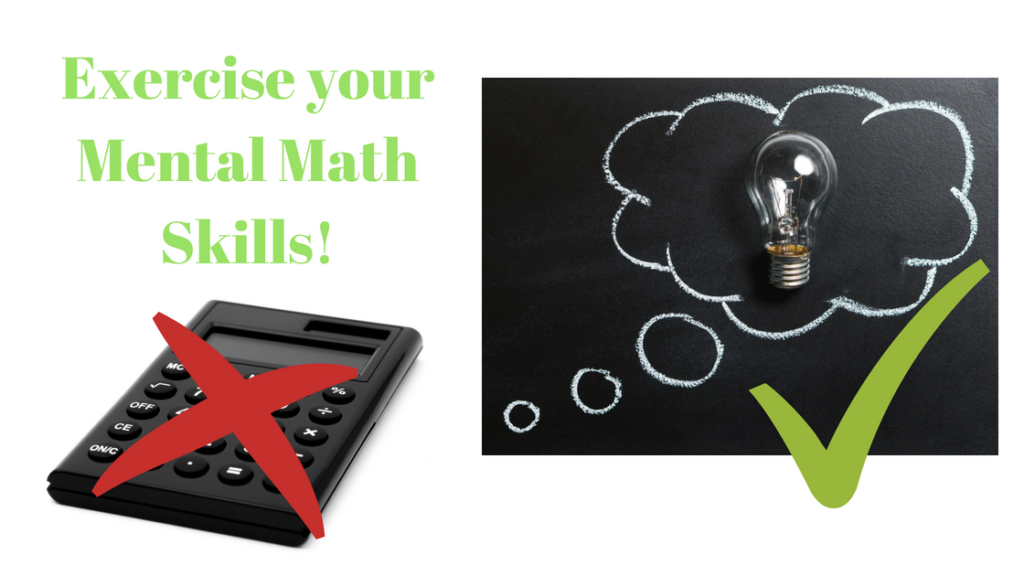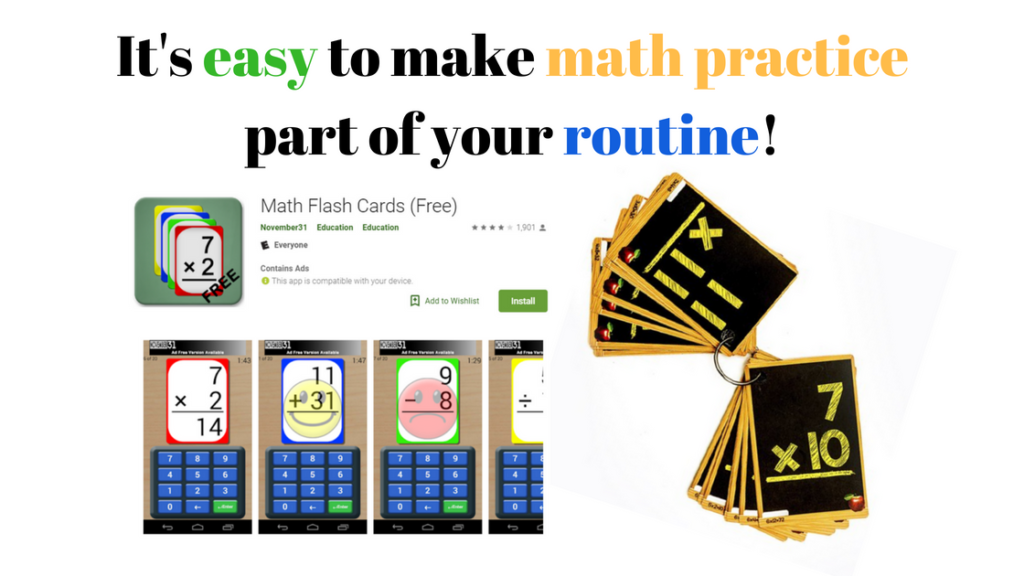Math can be such a pain.
Ever since the dawn of school, it seems to be the subject that we all love to hate.
But when it’s your child’s turn to take it on, you want to be able to teach them how to get better in math.
The good news is, you can!
Even if math was never your strongest subject, there are simple steps you can take to make math a lot less painful for both you and your student.
Here Are 5 Steps for You to Help Your Child be Better at Math.
Step #1: Believe You Can Be Good at Math

“I’m just not a math person.” “I just don’t get it.” “My brain doesn’t work that way.” “Numbers aren’t my thing.” ….Any of those sound familiar?
Whether it’s you or your child saying these things, the first step to being becoming good at math is to think—or know—that you really can be good at math!
Scientists have learned over the years that there is no such thing as the “math gene”—it all comes from experience and practice. So go ahead and banish these negative thoughts from your household! They are not helping you or your student become good at math.
Confidence and Hard Work are KEY When It Comes to Being Good at Math
If your child places themselves in the “not good at math” category, gently correct them: make sure that your child knows that they can do anything they set their mind to, including that thing they learned in math class today that seems so hard! Anyone who is willing to put in the work to learn how to be good at math, can be good at math.
Teach your child that their actions matter much more than any natural ability they may or may not have. Studies show that children who are praised for working hard, instead of being praised for how smart they are, choose to challenge themselves more. And hard work is a much bigger indicator of success than any other measure.
So teach your child to believe in themselves and be confident in the classroom and at home—encourage them to ask questions and share their thoughts. (If you’re really having trouble motivating your child to become good at math, check out this article here. But this “how to be good at math” thing isn’t all talk…
Step #2: Brush Up on Your Math Skills…Put Down the Calculator!

Yes, this means you, the parent. If your student sees you trying to be good at math, they are likely to follow your example!
As a private math tutor, I know how parents can affect a child’s performance in school. One of the patterns I’ve seen is that parents who have a good understanding of math and numbers tend to pass that knowledge down to their kids.
A common denominator among all my students struggling in math is a weak understanding of how to efficiently calculate numbers in their heads. If you are using your phone calculator to do basic math, your child will follow suit. If you really want your child to get good at math, get them to follow you in the habit of not needing one!
Spending a few minutes a day working on your mental math skills can go a long way when it comes to setting an example for your child and helping them when they have a question. (Plus it makes you look super smart!) It can also help your mental health, according to this study done at Duke University.
There are lots of easy ways to work mental math into your day. Try calculating the tip at dinner without your phone calculator!
Here’s a simple trick for tipping 20%: move the decimal point one place to the left, then multiply that number by two! For example, if your bill is $22.65, a 20% tip would be $2.265 (or roughly $2.30) times two, which is about $4.60!
For a great refresher on mental math skills we should all know, click here. Once you’ve looked over those strategies, you can test your skills using a website called Math Trainer, a great free tool that lets you not only practice your mental math but tracks your progress too!
Step #3: Make Time to Practice Math Skills with your Child

Now that you are a mental math wiz, how do you bestow this knowledge upon your child? Well, like you would with any other skill you want to share with them: practice!
Carving some time out of both of your busy schedules to practice math together is a great way to bond with your child and at the same time help improve their grades.
Flashcards are a cheap and easy tool to help your student memorize their math facts and hone in their mental math skills.
Even though I liked school, I was not a good at math my whole life…I had to learn how to be good at math too. I failed my multiplication tables test in third grade and I was so upset. I had never failed a test before.
So to help me, my dad bought a pack of multiplication flash cards. Every day after school, we would go through them together. It was frustrating for me at first, but after only a couple of weeks, I knew my multiplication tables by heart!
Pro-tip on how to be good at math? Repetition, memorization, and personalized, creative ways to help you remember the tough stuff!
On the ones I had trouble remembering, we came up with pneumonic devices to help me. I still use them to this day (and I went on to be a Statistics major in college). Click here for some awesome mental math tricks that will be sure to help your student on their own multiplication test (like how to multiply almost any number by 11, shown below)!
Whether it’s multiplication, division, addition, subtraction, or any other part of math that your child is stuck on, practice is what they need to master it–and they do need to master it in order to be good at math.
Some parents make the mistake of thinking that their child will be fine not knowing how to do one particular thing in math…they’ll eventually move on to the next lesson, right?
Unfortunately for their student, that’s just not how being good at math works!
Math builds on itself! If your child is lacking skill in one area, they are probably lacking in others also. And if they don’t fill in those gaps, it will lead to being even further behind in high school and college.
So as basic as the basics may seem, they are extremely important to your student’s success in the future. So please, practice!
Working with your child in math every day, or at least a few times a week, will show them that they are not in this alone, that you are willing to put in the work, too. Not to mention making math in the future so much easier.
Speaking of work…
Step #4: Help your Student with their Homework

I know, I know. The whole reason we finish school is so that we never have to do homework again.
However, going through your child’s homework with them holds them accountable for getting their work done, gives them the chance to show you where they are having trouble and to ask questions, and allows you to gain insight on how they think and problem solve. A few things to keep in mind when it comes to homework:
Homework Comes First!
Being good at math requires repetition and memorization.
Our brain is constantly “pruning” itself (or deleting information it doesn’t use to make room for more information).
Sso if we don’t re-think about something we just learned, we will surely forget it. Therefore, it’s super important that your child does their homework while their lesson from the day is still fresh in their minds.
Whether they come home right after school or have extracurricular activities, make sure that your student isn’t putting their homework off until the end of the day, when they are tired and more likely to get frustrated or give up.
Working on homework while they can easily remember the lesson is less stressful and reinforces the material they learned, making it easier to build on that material the next day.
You Are There to Guide, Not Take Over
The whole point of a student’s homework is to test their understanding of what they learned in class that day. That’s why it’s important for them to complete it on their own (or at least give it their best shot).
If they say things like, “I just don’t get it,” or, “I don’t know how to do this,” try to get them to be as specific as possible. You can ask them things like, “What exactly are you unsure of?” or, “Where exactly do you get stuck?”
Make sure they really give it a try before giving up. If they really have no idea what’s going on, make a note on their homework and let their teacher know exactly what they were having trouble on, and encourage your student to ask about it tomorrow.
Even better, you could set a good example for problem-solving and look to other resources for homework help! Websites like Khan Academy or even YouTube have a video on almost every mathematical process imaginable, explained in minute detail.
Take Advantage of the Resources Available to You as a Parent
In the old days, knowing what your student was working on at school all came down to asking what they learned that day at the dinner table, which we all know doesn’t have a 100% accuracy rate.
Now, parents have access to all kinds of online resources to help them stay connected on what their child is working on.
PowerSchool: Most schools have implemented an online gradebook system that allows students and parents to see current grades and assignments in real time. This can be especially useful for students who have trouble with turning in their work on time (or at all).
Teacher websites: Many teachers have their own websites that they update regularly with upcoming assignments and tests, and even class notes that can be looked at from home.
E-mail: Teachers are there to help students succeed. It’s their job!
If there is anything you would like to discuss with your student’s teachers, whether it’s how they behave in class, questions about an upcoming project or test, or suggestions for additional resources, keeping in touch with your student’s teachers can have wonderful effects on your student’s grades and their relationship with their teacher.
Know When to Ask for Help
If after all of these steps and tips your student is still struggling with math, look into seeking some outside help from a qualified tutor. If you think your child may have a learning disability or other handicap that could be preventing them from getting the most out of their schooling, talk to your student’s teacher about what resources the school has available.
But most importantly out of all these, be patient. Being good at math is half attitude. If you stay positive and upbeat during homework time, so will your student.
And lastly…
Step #5: How to Really Be Good at Math? Have Fun With It!

At the end of the day, we choose to do the things that we enjoy. When your student sees the importance of math and how it can be found in almost everything we do (including the things we do for fun!), they will be more willing (and more confident) to take math seriously in the classroom.
Use Some Screen Time for Math Games!
There are tons of free, easily accessible math-based games to help your child learn and have fun. One of the leading math game websites today is Math PlayGround. You can find a really helpful guide on how to best use the website here!
Incorporate Math Into Your Everyday
Make your errands interesting! Have your student estimate how much filling up the car with gas will cost, based on the price of gas, how empty your tank is, and how much gas your car can hold. You guess too! Whoever is closest wins a prize, or just bragging rights. ? Make sure to ask them how they came up with their guess, and you share how you did too!
Does your child like to cook? Have them tweak a recipe for more or less servings for fractions practice! Help them convert a recipe from metric units to standard! Wherever you can, show your child that math can be useful and fun.
In conclusion, parents have far more of an impact on their child when it comes to math than they realize.
- Creating a positive, can-do attitude toward math and encouraging your child to work hard and be confident can go such a long way.
- Using mental math instead of relying on a calculator sets a great example for your student. (And makes you smarter!)
- Practicing daily with flashcards is a great way to strengthen your child’s mental math skills and help them memorize important math facts.
- Helping your student with their homework is a great way to spend time together and helps you stay close to how they are doing in school every day.
- Incorporating math into your everyday in fun, creative ways shows your child that math is useful outside of school and can even be enjoyable.
Did any of these tips help your student in their math classes? If so, please leave a comment below!
Taylor Harbold
Latest posts by Taylor Harbold (see all)
- How to Be Good at Math (for Parents and Students) - August 22, 2018

